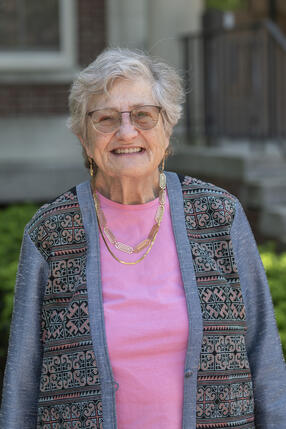Myra Marx Ferree: 2024 Centennial Medal Citation

Over the past several decades, the study of women, gender, and sexuality has transformed the face of the social sciences—and Myra Marx Ferree is one of the pioneers in sociology who made this seismic change a reality. Through her influential work on gender, family, and social movements; her focus on intersectionality and inequality; her expertise across American and European contexts; and her steadfast commitment to academic service, teaching, and mentorship, Ferree has profoundly shaped our understanding of gender in the modern Western world.
Ferree studied at the University of Hamburg in West Germany before completing her bachelor’s degree in political science at Bryn Mawr College in 1971. At Harvard, she pursued interdisciplinary graduate work in the Department of Psychology and Social Relations, earning her PhD in 1976. Ferree spent the first half of her career as a professor of sociology and women’s studies at the University of Connecticut; in 2000, she joined the faculty of the University of Wisconsin–Madison, where she is now Alice H. Cook Professor of Sociology emerita. In addition, Ferree remains active as a seminar co-chair at the Minda de Gunzburg Center for European Studies at Harvard.
Ferree’s publications have charted a course for gender studies within the field of sociology. Her books include Varieties of Feminism: German Gender Politics in Global Context, which won the Victoria Schuck Award for the best book in gender and politics from the American Political Science Association, and the bestselling textbook Gender: Ideas, Interactions, Institutions, coauthored with Lisa Wade, which has been taught at more than 400 universities and colleges and hailed as the “new gold standard” for gender studies courses. “Myra combines important original research with strategic know-how essential to institutionalizing a new field of knowledge,” observes Michèle Lamont, professor of sociology and African and African American studies and Robert I. Goldman Professor of European Studies. “Moved by strong moral and intellectual imperatives, she is now widely recognized for her exceptional generativity in addressing conceptual and empirical blind-spots. She is a powerful and effective intellectual change agent.”
Ferree brings sensitive topics into sharper analytical focus. In 2002, she coauthored Shaping Abortion Discourse: Democracy and the Public Sphere in Germany and the United States, which examines different narratives that frame abortion as a social issue in both Europe and America—an influential work that won a Best Book Award from the American Sociological Association. “Myra talks about things that other people don’t talk about,” explains Gökce Yurdakul, professor at the Humboldt University of Berlin and a former visiting scholar at Harvard’s Weatherhead Center for International Affairs. “She’s one of the rare people who can do comparative research in Europe and America on divisive issues that concern society today. That’s why she is so respected in both gender studies and in sociology: she’s a brilliant researcher, she’s not afraid to talk about issues that make people uncomfortable, she’s methodologically very meticulous, she can do comparative work, and it’s groundbreaking.”

Ferree has been particularly influential in her work on intersectionality, or the understanding of how different layers of identity—gender, race, class—compound and intersect in institutional dynamics of power. Her 2010 article, “Practicing Intersectionality in Sociological Research,” coauthored with Hae Yeon Choo, has been cited more than a thousand times. Ferree also brings an intersectional perspective to her mentorship and advocacy for others. “Many of the scholars Myra has supported have been women, people of color, first-generation students, international students, or queer students who didn’t feel that their approach, thinking, methods, and theories ‘fit into’ typical sociological research fields,” observes Kathrin Zippel, professor at the Free University of Berlin and a former seminar co-chair at Harvard’s Minda de Gunzburg Center. “Myra has created space for those who didn’t feel at home. She has had a profound, enduring effect on the lives of her mentees and colleagues, and on diversifying sociology.”
In addition to her scholarship, mentorship, and teaching, Ferree has served as president of Sociologists for Women and Society, as vice president of the American Sociological Association, and in editorial positions for a dozen journals and book series. In 2004, she received the Jessie Bernard Award, the American Sociological Association’s highest career honor for gender scholarship.
“Myra Marx Ferree has become one of the most influential scholars of gender in the United States, and around the world,” says Frank Dobbin, Henry Ford II Professor of the Social Sciences and chair of the Department of Sociology. “Her work has inspired others to take up the burning questions that motivate her, helping to make each of the fields she works in places of lively debate and active research. She has done this by mentoring, and collaborating with, an army of fantastic doctoral students, and by modeling how to be a generous and open convener and institutional leader. She is the leading light of her generation of sociologists.”
Myra Marx Ferree, for your field-shaping, globe-spanning scholarship on feminism, family, intersectionality, and many other topics that you have helped place at the heart of sociology and gender studies, and for your profound impact as a mentor, teacher, and intellectual leader, we are proud to award you the 2024 Centennial Medal.
Photo credit: Tony Rinaldo
Get the Latest Updates
Join Our Newsletter
Subscribe to Colloquy Podcast
Simplecast Stitcher





